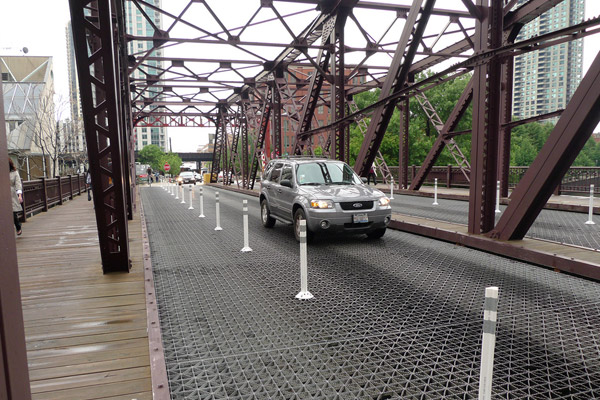
I'm mostly immune to the snide tone writers like Mark Konkol take towards people who commute by bike ("bicycling crazies," "rabid cyclists," "militant bicycle people," "faithful bike-riding followers," "hipsters on Huffys," just in one short piece!), but I still don't like bad ideas: "if cyclists need their own lanes, they should pay for it — maybe by requiring a bicycle sticker tax for commuters."
Konkol isn't the only local journalist floating this idea; in a less smug piece, John Kass calls out free-riding bicyclists:
Listening, Rahmfather? How can anyone argue that the city should spend cash to create bike lanes for pedaling One Percenters while not having the cash to hire enough cops to protect neighborhood folks dying in gang wars?
The Rahmfather isn't the mayor of Portlandia. He's the mayor of Chicago. But his sucking up to bicyclists seems less about serving Chicago and more about appealing to hipsters on the East and West coasts as he stokes his national political ambitions.
In principle I don't actually have a problem with a "bicycle sticker tax." I don't think all cyclists do, though many are skeptical for other reasons. In a smart comment in response to Kass, one of my cyclist friends noted the issue: "Before you know whether to tax cyclists, you really need to know what they cost you (or save you)…. What's being proposed *is* in fact a money grab, because the costs proposed aren't commensurate with the cost of the activity, and it's not an activity you want to disincentivize."
The problems with it are in the real world, though there are similar yet far superior alternatives, if you're actually interested in funding bike infrastructure and not just hipster-baiting.
Minneapolis has a more active bike-commuter culture than Chicago, and the state tried something like this, but abandoned it for obvious reasons: 'The administrative costs were more than the revenue generated,' according to that state's Department of Transportation.
Los Angeles tried it recently, too, at least until police chief William Bratton—of zero-tolerance broken-windows fame—said it was a bad idea (PDF):
In short, our research determined that our Department-wide bicycle licensing efforts were all but defunct. Given our continued efforts to deploy all available sworn personnel to field operations in direct support of our crime fighting and community policing efforts, reviving the bicycle licensing program at this time is not prudent.
The State of Washington floated the idea and killed it for similar reasons:
After talking with other states, the department believes the programs raise little money — if any — beyond what they cost to run, Reeves said. "We wouldn't see a big opportunity to improve facilities with that kind of a program," she said. "We also have some survey results that are fairly recent that show that most cyclists also own a car or multiple cars, so they're paying license fees and gas taxes."
Property taxes cover much of the costs of smaller roads and transportation facilities, added Marty McOmber, a spokesman for Nickels.
"That is something that is spread equitably around the city, and it's the funding mechanism that we have to live with in this state," he said. Mandatory bike registration is "not something that we would be inclined to pursue," McOmber said. "It's not really clear what benefit it would have and it's fraught with a lot of complications."
A bicycle tax would give cyclists some skin in the game. (Well, besides the fact that vehicular infrastructure doesn't pay for itself through fees and taxes. People who bike, even if they don't own cars, are also paying for roads by dint of existing.) There may be some value to a tax for symbolism's sake, and for additional if very modest revenues, but it would obviously work better as an excise tax on bikes or equipment than creating a new bureaucratic arm. Colorado Springs has had some success over the years with a $4 tax on new bicycles. It wouldn't fully fund bicycle infrastructure, but similar taxes and fees on cars and gas don't fully fund their infrastructure, either. Update: At Chicagoist, Chuck Sudo notes where the bike-lane funding comes from.
I'm more offended by the idea that bicyclists are "hipsters" or "one percenters," smug rich liberals pretending that they're saving the planet, or other cheap targets, mostly because it's not true (PDF, via Eric de Place):
In 2001 there was almost no difference in bike mode shares among the four income quartiles. By comparison, the 2009 NHTS indicades a somewhat higher bike mode share in the lowest income quartile (1.3 percent) than in the top two income quartiles (1.1 percent). Although cycling rates do not vary much by income, it seems likely that low-income persons cycle mainly for work trips and other utilitarian purposes, while high-income persons may cycle more for recreation and exercise.
There are legitimate discussions to be had about whether separate bike lanes actually make for more and safer cycling. There's an even better one to be had about cyclist education and enforcement—in an excellent post, Brent Cohrs discusses a point I've made before, that driver education in America essentially ignores cycling to the detriment of cyclists and drivers. Compare that to the Netherlands, where bicycle road tests are mandatory.
That doesn't seem to have cut down on cycling there, as education makes people more confident, and if my experience is any guide, Americans are less likely to bike because of fear and inexperience. Marginalizing the entire form of transportation does little more than scare newbies off the streets, leaving them to the minority of aggro bikers.
Photograph: Chicago Bicycle Program (CC by 2.0)


